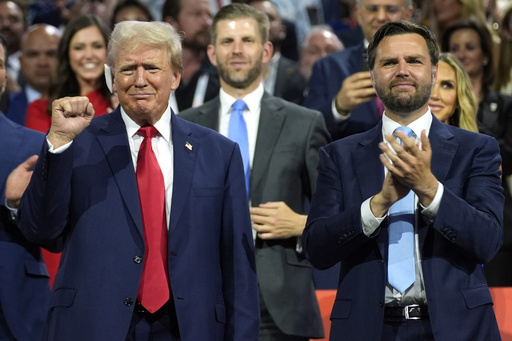Vice President Kamala Harris and other Democratic figures have launched a new line of criticism against Republicans by portraying Donald Trump and Ohio Senator JD Vance as “weird.” This term is being used by Democrats in interviews and online, particularly in response to Vance’s statements on abortion and his previous comments suggesting that political leaders without biological children lack a direct stake in the country. The Democrats’ use of the “weird” label seems to have given them a messaging advantage that was not as prominent during President Joe Biden’s reelection campaign. Trump’s team, renowned for shaping political discourse with his remarks, has been trying to counter this narrative by highlighting what they view as peculiarities about Democrats.
David Karpf, a strategic communication professor at George Washington University, commended the creators of the “weird” message for its effectiveness. Labeling Republican statements as “weird” is seen as a concise approach that resonates quickly with Harris supporters and frustrates opponents, leading them to further amplify it through unbalanced responses. Karpf noted that thus far, the Trump-Vance team has struggled to find an effective response to this critique. Harris and her allies have been consistently using the “weird” label in various contexts.
The characterization of Trump and Vance as “weird” was also echoed by Minnesota Governor Tim Walz, a Democrat, who referred to them as “just weird” in a recent interview, describing Trump’s repeated references to the fictional character Hannibal Lecter as another example. Harris’ campaign has actively incorporated the “weird” descriptor into their messaging, particularly targeting JD Vance for his views on abortion. Democratic Senators Brian Schatz and Chris Murphy also criticized Vance for his past comments regarding childless Americans, labeling the ideas as “super weird.”
During a recent fundraiser, Harris herself referred to some of Trump’s statements as “just plain weird,” emphasizing the need to highlight and challenge such rhetoric. The Democrats’ use of the term “weird” is partly in response to Vance’s previous derogatory comments about prominent Democrats without biological children, including Harris, labeling them as “childless cat ladies.” This strategy has been compared to Harris’ past remarks contemplating how to respond to Trump’s behavior during debates, indicating a history of challenging such behavior.
In response, the Trump campaign has sought to change the conversation and redirect focus on Harris’ policy proposals, with some allies highlighting what they view as failures in her approach. They have criticized Harris for being soft on crime and allowing illegal immigrants out of prison, framing her decisions as detrimental to public safety. The attempt to shift attention back to Harris and challenge her policies indicates a broader strategy from the Republican side.
Overall, this dynamic of labeling opponents as “weird” reflects a broader trend in political messaging, with both parties attempting to shape perceptions of their rivals through strategic communication tactics. This tactic has roots in previous political campaigns and is being used by Democrats to counter longstanding efforts to portray Harris in a negative light. The ongoing exchange of critiques and counter-critiques underscores the intensity of political discourse in the current landscape.




